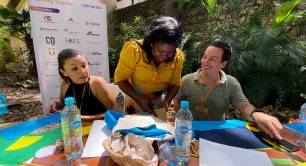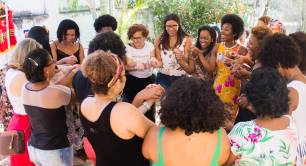Scars of slave trade a grim backdrop as Latimpacto conference kicks off in Rio
If last year’s Latimpacto conference was described as a “disruptive party”, this year’s event kicked off on a reflective and sombre note – at least for a few dozen of the 600 delegates, who got a glimpse of the deep scars of slavery still visible in Brazil today.
The group had joined a walking tour – one of ten local visits on offer on day one of the conference, which takes place from 28-30 August in Rio de Janeiro – that explored the history of Africans and Afro-descendants in the area known as Pequena África (‘Little Africa’).
The tour took in the remains of Valongo Wharf (pictured above) in the former harbour area of Rio, a UNESCO world heritage site said to be the most important physical trace of the arrival of African slaves in the whole of the Americas. An estimated 900,000 Africans arrived in South America via Valongo’s cobblestones – more than landed anywhere else; in total, more than 5.5m African slaves were sent to Brazil between the 16th and 19th centuries, seven times as many as those who arrived in the USA. The archaeological site was a vital marker of the slave trade, tour guide Flavio Henrique Cardoso said, speaking via an interpreter, because erasing other people’s history was unfortunately a “common practice”.
The group also visited the Instituto Pretos Novos (New Blacks Institute), where a mass grave had been discovered in the 1990s – the thousands of dumped and sometimes incinerated bodies of slaves who had died on arrival and could not therefore be thrown into the ocean, Cardoso explained. It was important to bring visitors such as those attending the Latimpacto conference – impact investors, philanthropists and others from across the Americas and beyond – to memorial sites like these, he added, because they could support them and spread awareness of their message. “The Black population alone cannot handle this issue… Racism wasn’t created by Black people,” he said.
The Black population alone cannot handle this issue
Corporate leadership
Brazil’s claims to be a “racial democracy” – a multiracial society where there is no discrimination on the basis of race – are increasingly challenged, with some saying the myth is finally “crumbling”.
Alexandre Nadai (pictured), who leads communications at IPN, said that combatting racism today required more Black people in leadership positions in businesses. Many companies created “diversity” roles or hired Black people at more junior levels, but not in management roles, he said.
Among the supporters of IPN is L’Oréal Brazil, whose office is nearby, and which brings its employees and “key stakeholders” to visit and learn from the exhibitions there, said Helen Pedroso, director of corporate social responsibility and human rights.
We have to learn from the past... and act today to invest in the future
Pedroso (pictured) – who joined L’Oréal Brazil a year ago as its “first brown woman in the C-level” – told Pioneers Post her company had started its “own journey of diversity and inclusion” in around 2017.
It now hosts and is part of a movement known as ‘Mover’ which has brought together nearly 50 large firms to progress on racial equity. L’Oréal has also been involved in creating a beauty school in the neighbourhood which trains Black women from the favelas (slums) to become hairdressers.
“We have to learn from the past... and act today to invest in the future,” Pedroso said.
Racial equity is among the themes up for discussion during the conference sessions on Tuesday and Wednesday, as well as nature conservation, corporate impact and innovative financing.
Pioneers Post is attending this week's conference as a media partner; Latimpacto contributed towards our costs of attendance. Check back soon for more stories.
Top picture: Tour guide and historian Flavio Henrique Cardoso speaking in front of the Valongo Wharf Archaeological Site in Rio de Janeiro
Thanks for reading our stories. As an entrepreneur or investor yourself, you'll know that producing quality work doesn't come free. We rely on our subscribers to sustain our journalism – so if you think it's worth having an independent, specialist media platform that covers social enterprise stories, please consider subscribing. You'll also be buying social: Pioneers Post is a social enterprise itself, reinvesting all our profits into helping you do good business, better.



